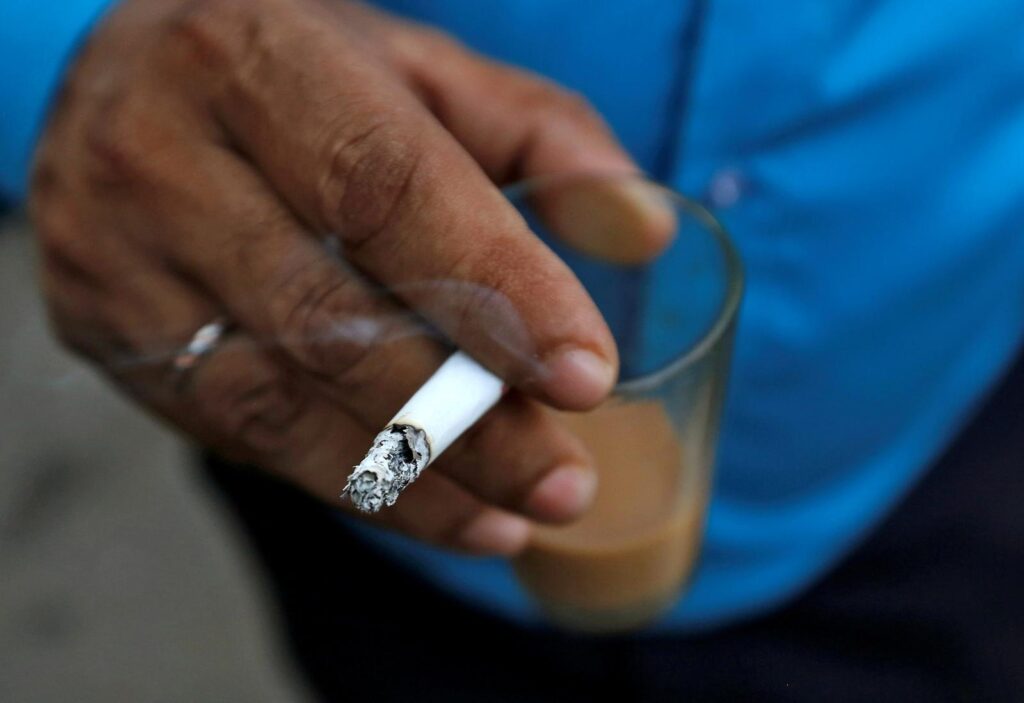Lifestyle, Smoking To Blame For Rise In NCDs In Tribal Areas: Experts
Nov 30, 2022 | Pratirodh Bureau
The brunt of the environmental harm caused by tobacco is felt in developing countries — including China, India, Brazil, Indonesia and Zimbabwe — where the majority of tobacco cultivation and cigarette production now occurs
(Source: PTI)
Lifestyle changes, consumption of unhealthy foods, tobacco smoking and urbanisation may be among the factors behind increase in deaths due to non-communicable diseases (NCDs) such as diabetes and cancer in the tribal districts of India, experts say.
A recent survey by the Indian Council of Medical Research (ICMR) of over 5,000 family members of deceased tribal people, interviewed between 2015 and 2018 in 12 tribal districts of India, showed that NCDs accounted for 66 per cent of deaths.
“Tribal communities are being exposed to risk factors of urbanisation, consuming refined foods, fast food, easy road transportation and modern day lifestyle. They are gradually giving up their own traditional and cultural ways of living. All these have impacted their life,” Prashant Mathur, Director of ICMR’s National Centre for Disease Informatics and Research, Bengaluru, told PTI.
“NCDs are primarily driven by our modern ways of living, and thus we are having more and more cases and deaths due to NCDs in the 12 tribal districts,” he added.
The expert noted that the higher death rates due to NCDs may also be because of improvement in life expectancy and better control measures for infectious diseases in these tribal districts.
“Earlier, people used to die because of various infectious diseases like malaria, tuberculosis, diarrhea. Now, with better hygiene, and better infectious control, non-communicable diseases emerge as a major problem,” he said.
Professor Lalit Kumar, former Head of Department of Medical Oncology at the All India Institute of Medical Sciences (AIIMS), New Delhi, noted that rural India, including the tribal areas, are changing “very very fast” and are witnessing shifts in food habits similar to the urban areas, leading to the rise of NCDs.
“Junk food use, smoking and consumption of alcohol have gone up though these tribal people consume homegrown liquor. Normally, among other causes of death, one-third are related to smoking while another one-third related to diet including junk food,” he told PTI over phone.
Public health expert Chandrakant Lahariya agreed with the two experts.
“The NCDs are rising across the country. Even before this study there were studies on diabetes and hypertension, obesity and other risk factors for NCDs. The rise in the tribal districts is because of an increasingly sedentary lifestyle in all settings, deep penetration of junk food items, and an inactive lifestyle,” Lahariya told PTI.
Mathur cautioned that lack of interventions to improve lifestyle and food habits will lead to increase in NCDs among the tribal populations in the future.
Going forward, he said, acknowledging the fact that tribal populations are suffering from NCDs and increasing their awareness can help improve the situation.
“What is required is more awareness. But, first we should acknowledge that NCDs are also a problem of tribal populations. And then we should see how we can help them to maintain tribal culture and tradition, which includes maintaining a healthy lifestyle. Development and everything have to happen there also, but we need to see how we balance out development processes versus health. There is a tribal ministry which looks at all these aspects. I think the thought process should begin,” Mathur noted.
Stating that cervical cancer among women in the north east region is the highest in the country compared to other parts, Kumar predicted a deterioration in the situation in these states.
“A rise in the NCDs is expected… definitely, there will be an increase in the future. We are already witnessing such a rise in the last 20 years. Numbers have been gradually increasing. There has been an increase in cancer cases, but breast cancer is more than other cancers. Expect an increase in cervical cancer, lung cancer, colon cancer, uterus cancer cases throughout the country, including these 12 tribal districts,” he said.
“It calls for a better concerted effort, focused interventions to protect these tribal populations from reasons of non-communicable diseases. It will be better to revive and maintain their own tribal tradition. And this is the message which comes out from the study,” said Kumar.
Pointing to the recommendations formulated by an expert committee on tribal health under the chairmanship of Dr Abhay Bang two years ago, Lahariya said the committee had suggested creation of a functional, sustainable, and universal health care system for the tribal people by 2022.
“It had also recommended allocation and spending on the health budget equal to 8.6 per cent of the total health budget,” he added.
